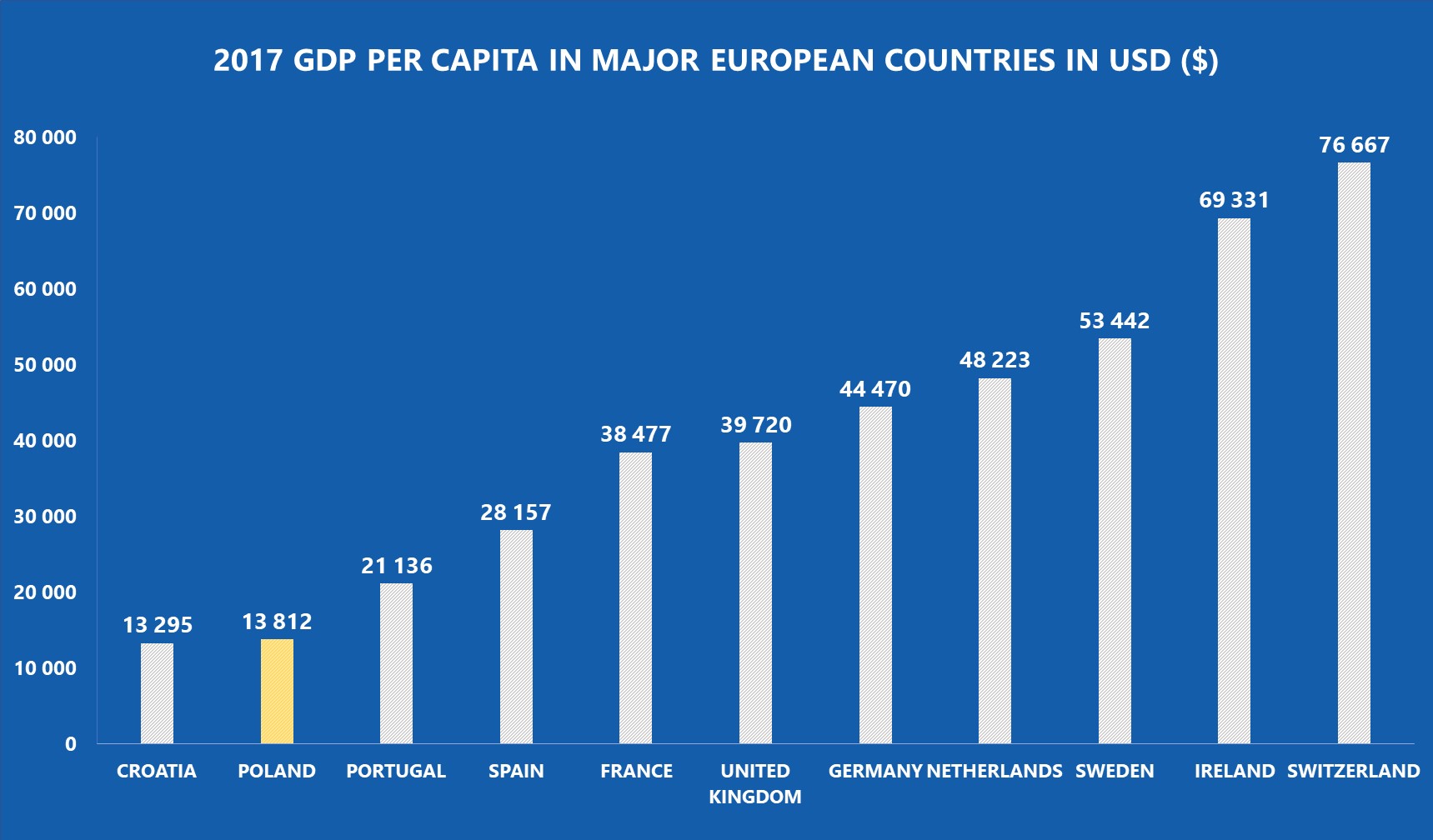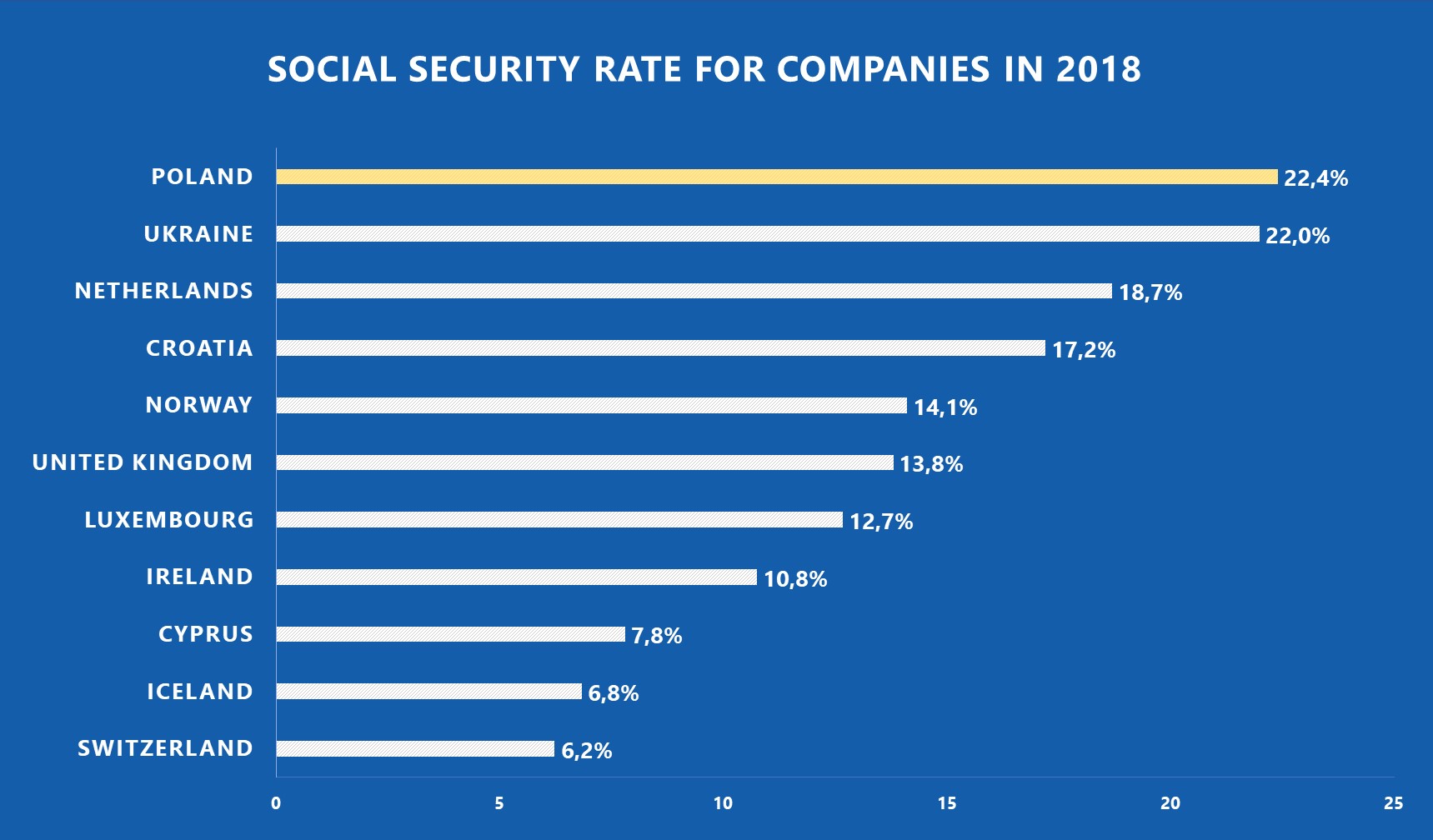The Polish government regularly increased taxes paid by companies (ZUS, PIT, CIT, PPK). Grégoire Nitot, the founder and CEO of Sii Poland, discusses the possible negative consequences of such actions for Polish economy, Polish society and Polish people in the coming years.
Have you ever thought how Ireland, Switzerland or any other European country, with limited natural resources, became one of the richest in the world in terms of GDP per capita ratio? How come major multinational companies (examples listed below), largest in their respective sector, decide to locate their European or even worldwide headquarters in those countries?
- Roche, Novartis, Credit Suisse, Nestle, ABB, Adecco, UBS, Holcim or Glencore for Switzerland
- Apple, Google, Accenture, Dell for Ireland
Let’s start by stating the obvious. The main objective of any private company in the world is to make profit. For that reason it is natural that companies invest if they are able to benefit from it in some way. Therefore they invest:
- close to their customers and markets,
- in countries with attractive tax rates & low bureaucracy, simple accounting rules
- in locations, where production costs may be significantly reduced thanks to competent employees, who will perform their duties well at a competitive employment cost.

In my opinion if Poles want to get richer than the Swiss or the Irish, firstly it is crucial for our country to benchmark the best and be inspired by them. Currently the Polish government is heading the opposite direction by planning to increase the social security (ZUS) rates. The main aim of this decision is to find an additional source of income to finance the recently introduced populist programmes, such as 500+ or lowering of the retirement age. Poles are happy with the latter and it may be the reason behind ruling party winning the next elections. But this short-sightedness, aimed at electoral success, will have a negative impact on the society in a longer term. While increasing social benefits, Poland may one day end up like Greece, Italy or France which have major problems (due to excessive debts, high taxes, complex labor law which cause massive unemployment).
The economical reasoning behind the problem
Having stated the facts, it is now time to answer the compelling question – how to make Poland one of the most powerful countries in Europe? One of the ways is to attract multinational companies to Poland and encourage them to relocate here their worldwide or European headquarters. But how to do that? The answer is simple – introducing regulations tailored to business. For example:
- flexible and effective employment law as well as work contracts (less complicated to terminate employment, short notice period),
- simplified accounting rules, reduce administration bureaucracy
- competitive & affordable amount of taxes (income tax – CIT & PIT, social security rates – ZUS, both for companies and private persons).
For that reason, countless companies have been investing in Poland in the recent years, such as: HSBC, Citi, Credit Suisse, Intel, ABB, Volvo, State Street, Volkswagen, Mercedes Benz, and last, but not least: Sii. Such investments were possible not only thanks to outstanding qualifications of Polish people, but also competitive employment cost compared to other European countries.

This might change dramatically after the ZUS rates increase planned by the Polish government. There are several ways, in which this decision might impact our country in a negative way. After the new regulations are implemented, the employers will have to bear a higher employee cost. As a result, it would become more beneficial for any of the above mentioned investors to move their business from Poland to other countries in Asia, South America or Europe, such as: Ukraine, Bulgaria, Serbia, Croatia, Spain, etc.
Since I operate in the IT business, let’s put the theory into practice with an example of a software engineer. If employment of such an engineer becomes cheaper in Croatia or Serbia, then Poland becomes less attractive against the competition. Of course there are many factors influencing such a decision, but the simple logic would dictate that I should move Sii to a country, where the employment conditions are preferential. If it was more cost-effective to employ elsewhere, as a result less jobs would be created in Poland.
The social dimension of the issue
But there is another side to ZUS increase apart from the employer’s perspective. It will most probably result in lower net salary for employees in Poland, therefore they would spend less money in Poland, which would have a negative impact on the Polish economy. Hence in my opinion ZUS will affect everyone in a negative way.
At present employees earn respectable, prospective salaries and have a wide variety of career development opportunities. The ZUS rates increase will inevitably lead to a market transformation. Poland will no longer be an employees market, which means that the employees will no longer be in a favourable position. As a result the chance of salary increase will decline and finding a new job will be more difficult due to higher competition between job seekers. As a consequence, the career evolution possibilities will be much more limited. On the other hand, one of the global consequences may be the increase of unemployment rate, which usually leads to a slow-down of the social progress in general.
Another point is the problem of unequal treatment depending on the form of employment. There is a strong risk that in the post-ZUS-increase reality most of Polish employees would prefer to sign B2B contracts instead of UoP (umowa o pracę – permanent job contract). As a result the Polish government would receive less income from ZUS, which is the exact opposite of the desired effect.

The crisis avoidance strategy
All of the above lead to one conclusion: the increase of ZUS would most likely have many long-term negative consequences and should be avoided. Paying taxes is crucial to financing the services imperative to the entire society, such as police, justice, infrastructure, education, health, etc., and to maintain social equality through sharing with the less privileged (retired, permanently ill or disabled).
However the amount of taxes has to be tailored to the payers’ capabilities and competitive in comparison to other countries. That way Poland would be able to attract investors and, by extension, create workplaces for Polish people, enabling the country to grow economically.
In my opinion, a reasonable and competitive amount of taxes is up to 30% of a country’s GDP (all taxes included; not only ZUS, but also VAT, CIT, PIT, PFRON or real estate taxes). Higher rates, like in France, where it reaches 48% of GDP, are difficult to be perceived as advantageous any of the parties involved in the process.
If Poland wants to become one of the richest and most competitive countries in the world, even compared to Singapore or Switzerland, it should act in a more flexible manner and introduce a tax level, which would make it a country highly attractive to investors. However currently populist political parties, which make short-sighted decisions in order to win the next elections, are dangerous to the long-term stability, competitiveness and growth of our country. Poland can become one of the richest countries in Europe, but in order to accomplish that, we should certainly rethink our approach to the taxes and social security rates.
I am very curious of your opinion. Whether you agree with me or think completely differently, let me know. Who knows – maybe you will manage to persuade me?
Greg.

A very interesting point of view – I respect people with strong opinions however I absolutely disagree. I could say ‘yes’ to that if we wanted Poland to be like countries less developed than Eastern Europe, where many companies outsource their business and start their BPOs and SSCs. But I think Poland has bigger aspirations – we should raise taxes and prices to be more like Switzerland rather than Ukraine or Bangladesh. We want big companies to set their headquarters here, not outsource finance and IT only because it’s as cheap as less developed part of the world with better and shorter flight connections. That’s how I feel.
Mostly agree with You Greg, except that not only current government following this way, but any other after ’89.
IHMO because after WW2 and Communism most of our poor Nation still can not imagine live without social and public “free” services.